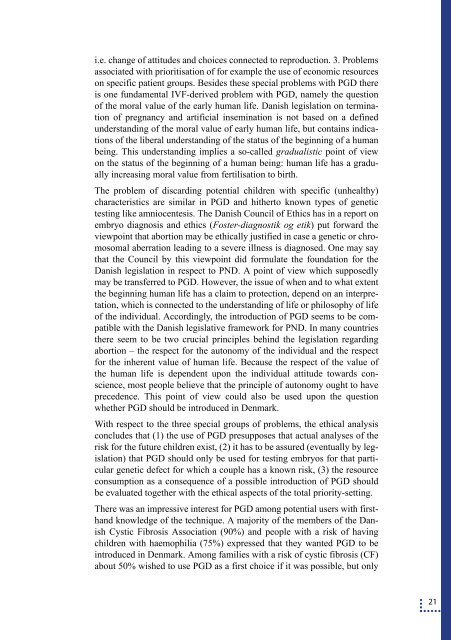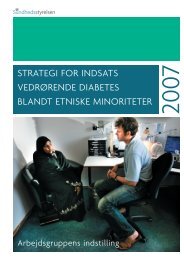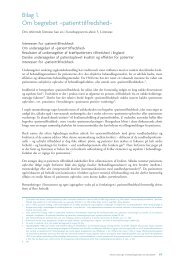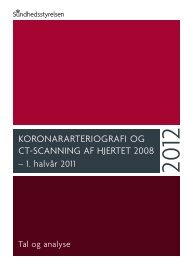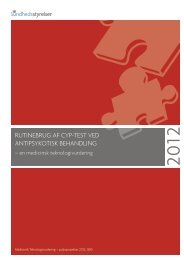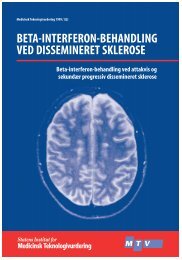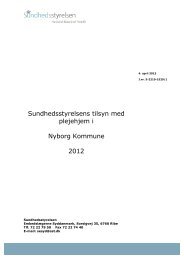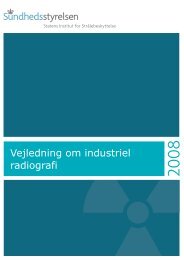Præimplantationsdiagnostik - Sundhedsstyrelsen
Præimplantationsdiagnostik - Sundhedsstyrelsen
Præimplantationsdiagnostik - Sundhedsstyrelsen
Create successful ePaper yourself
Turn your PDF publications into a flip-book with our unique Google optimized e-Paper software.
i.e. change of attitudes and choices connected to reproduction. 3. Problems<br />
associated with prioritisation of for example the use of economic resources<br />
on specific patient groups. Besides these special problems with PGD there<br />
is one fundamental IVF-derived problem with PGD, namely the question<br />
of the moral value of the early human life. Danish legislation on termination<br />
of pregnancy and artificial insemination is not based on a defined<br />
understanding of the moral value of early human life, but contains indications<br />
of the liberal understanding of the status of the beginning of a human<br />
being. This understanding implies a so-called gradualistic point of view<br />
on the status of the beginning of a human being: human life has a gradually<br />
increasing moral value from fertilisation to birth.<br />
The problem of discarding potential children with specific (unhealthy)<br />
characteristics are similar in PGD and hitherto known types of genetic<br />
testing like amniocentesis. The Danish Council of Ethics has in a report on<br />
embryo diagnosis and ethics (Foster-diagnostik og etik) put forward the<br />
viewpoint that abortion may be ethically justified in case a genetic or chromosomal<br />
aberration leading to a severe illness is diagnosed. One may say<br />
that the Council by this viewpoint did formulate the foundation for the<br />
Danish legislation in respect to PND. A point of view which supposedly<br />
may be transferred to PGD. However, the issue of when and to what extent<br />
the beginning human life has a claim to protection, depend on an interpretation,<br />
which is connected to the understanding of life or philosophy of life<br />
of the individual. Accordingly, the introduction of PGD seems to be compatible<br />
with the Danish legislative framework for PND. In many countries<br />
there seem to be two crucial principles behind the legislation regarding<br />
abortion – the respect for the autonomy of the individual and the respect<br />
for the inherent value of human life. Because the respect of the value of<br />
the human life is dependent upon the individual attitude towards conscience,<br />
most people believe that the principle of autonomy ought to have<br />
precedence. This point of view could also be used upon the question<br />
whether PGD should be introduced in Denmark.<br />
With respect to the three special groups of problems, the ethical analysis<br />
concludes that (1) the use of PGD presupposes that actual analyses of the<br />
risk for the future children exist, (2) it has to be assured (eventually by legislation)<br />
that PGD should only be used for testing embryos for that particular<br />
genetic defect for which a couple has a known risk, (3) the resource<br />
consumption as a consequence of a possible introduction of PGD should<br />
be evaluated together with the ethical aspects of the total priority-setting.<br />
There was an impressive interest for PGD among potential users with firsthand<br />
knowledge of the technique. A majority of the members of the Danish<br />
Cystic Fibrosis Association (90%) and people with a risk of having<br />
children with haemophilia (75%) expressed that they wanted PGD to be<br />
introduced in Denmark. Among families with a risk of cystic fibrosis (CF)<br />
about 50% wished to use PGD as a first choice if it was possible, but only<br />
21


